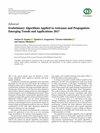A Compact Planar Ultra-Wideband Array Antenna
IF 1.1
4区 计算机科学
Q4 ENGINEERING, ELECTRICAL & ELECTRONIC
引用次数: 0
Abstract
Ultra-wideband (UWB) antennas have recently gained prominence in communication, radar technology, and electronic warfare domains. The quick development of these antennas is due to the wide bandwidth requirements of pulse radar, ground penetrating radar, electromagnetic compatibility, spaceborne communication systems, stealth target detection, and more. Aiming to address the defects of existing UWB antennas, which often have narrow bandwidth and low gain, a planar ultra-wideband microstrip array antenna was designed to achieve good ultra-wideband characteristics and effectively improve the gain of the antenna. The initial bandwidth of the rectangular monopole antenna was 10 GHz–20 GHz. After loading multiple steps on the monopole patch, the bandwidth was increased to between 10 and 38 GHz. Using the new ultra-wideband array method that combines series feed and angle feed and the defective ground structure (DGS), the array maintains the ultrawide bandwidth span of 10–38 GHz of the array element, and the maximum gain of the antenna in the bandwidth was increased from 5.18 dBi to 9.55 dBi. The challenge of impedance matching of antenna units in ultra-wideband is resolved by the novel array technique, which also increases the antenna’s gain within the bandwidth. The antenna simulation is consistent with the measurement results. With its extensive operating frequency band, high gain, compactness, and favorable radiation attributes, this newly designed antenna holds significant promise for application in UWB radar systems.一种紧凑的平面超宽带阵列天线
超宽带(UWB)天线最近在通信、雷达技术和电子战领域获得了突出的地位。这些天线的快速发展是由于脉冲雷达、探地雷达、电磁兼容性、星载通信系统、隐身目标探测等对宽带的需求。针对现有超宽带天线带宽窄、增益低的缺点,设计了一种平面超宽带微带阵列天线,实现了良好的超宽带特性,有效提高了天线的增益。矩形单极天线的初始带宽为10 GHz - 20 GHz。在单极贴片上加载多个步长后,带宽增加到10 ~ 38 GHz之间。采用串联馈电和角度馈电相结合的新型超宽带阵列方法,结合缺陷地结构(DGS),阵列保持了阵列元件10-38 GHz的超宽带跨度,天线在带宽上的最大增益由5.18 dBi提高到9.55 dBi。该阵列技术解决了天线单元在超宽带条件下的阻抗匹配问题,提高了天线在带宽范围内的增益。天线仿真与实测结果吻合较好。这种新设计的天线具有广泛的工作频带、高增益、紧凑和良好的辐射特性,在超宽带雷达系统中具有重要的应用前景。
本文章由计算机程序翻译,如有差异,请以英文原文为准。
求助全文
约1分钟内获得全文
求助全文
来源期刊

International Journal of Antennas and Propagation
ENGINEERING, ELECTRICAL & ELECTRONIC-TELECOMMUNICATIONS
CiteScore
3.10
自引率
13.30%
发文量
158
审稿时长
3.8 months
期刊介绍:
International Journal of Antennas and Propagation publishes papers on the design, analysis, and applications of antennas, along with theoretical and practical studies relating the propagation of electromagnetic waves at all relevant frequencies, through space, air, and other media.
As well as original research, the International Journal of Antennas and Propagation also publishes focused review articles that examine the state of the art, identify emerging trends, and suggest future directions for developing fields.
 求助内容:
求助内容: 应助结果提醒方式:
应助结果提醒方式:


